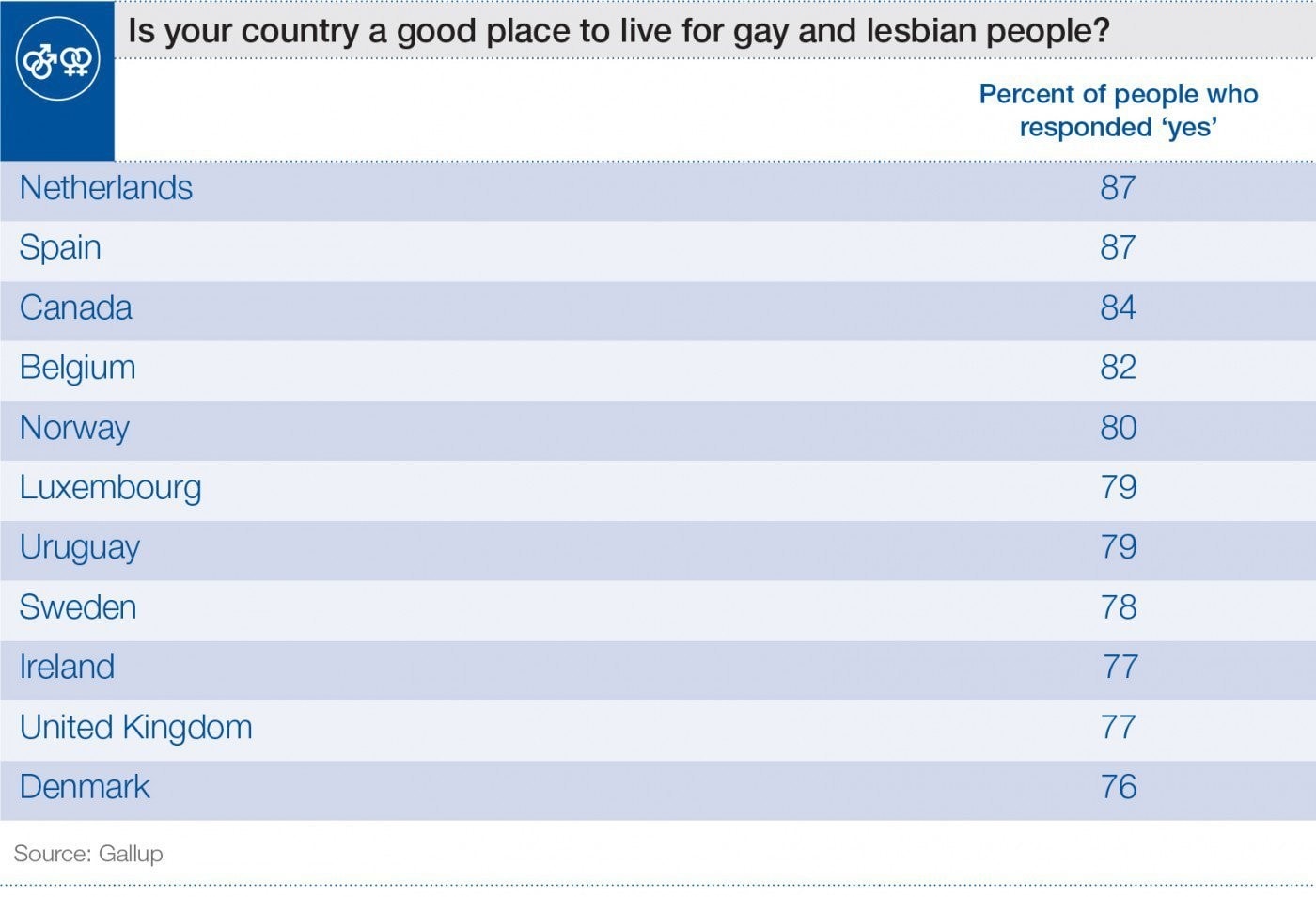Who leads Europe for LGBT rights?

Image: REUTERS/Karoly Arvai
Stay up to date:
Gender Inequality
Malta has sprung to the top spot of ILGA’s Rainbow Map 2016 - an overview of the human rights of lesbian, gay, bisexual, transgender and intersex people (LGBTI). The island nation, which only ranked 11th in 2014, dethroned last year’s number one, the United Kingdom, following numerous reforms to protect the human rights of the LGBTI community. Great Britain and Belgium ranked second and third.

Malta’s success story has been hailed by ILGA as the result of “an irresistible combination of determined activism and unprecedented political leadership at a national level.” Among other reforms, Malta created a global first with the 2015 passing of its Gender Identity, Gender Expression and Sex Characteristics Act, which the ILGA praises as ‘visionary’. Ireland was also commended for its 2015 equal marriage referendum, the first of its kind.
New paths to progress
Many of the strides taken in 2015 came in the shape of rights for trans and intersex people. Malta led the way for intersex rights by banning the unnecessary surgery on an individual’s sex characteristics without their consent, while also enacting new school policies for trans, intersex and gender variant students. Greece passed its own legislation to protect intersex people from discrimination, as did Finland.
Trans people also saw shifts in national policy which looks set to continue this year. In 2015, Ireland passed its Gender Recognition Act, which allows people over the age of 18 self-determination of their legal gender. Numerous European nations are considering a switch to similar models including Sweden, France, Belgium, Finland, Greece, Germany and Norway.
Progress was also made for LGBTI families, with a number of new countries enacting equal marriage laws, civil partnerships and adoption rights. Ireland became the 12th European nation to have equal marriage following a historic referendum. Luxembourg, meanwhile, now allows same-sex marriage as well as adoption for same-sex couples. The country’s Prime Minister was one of the first to take advantage of the new legislation. Greece and Cyprus also began allowing civil partnerships.
Is Europe slowing down?
The progress seen in 2015 is encouraging but also presents a new risk of complacency in Europe. The continent is often regarded as the most LGBTI friendly. According to Gallup, eight out of 10 of the most ‘gay friendly’ countries in the world are in Europe.

The ILGA’s Annual Review, which accompanies the Rainbow Map, notes that countries which have traditionally been seen as progressive have begun to stand still. One reason for this slow-down is the assumption that once a law is passed, the battle has been won. Brian Sheehan, co-chair of ILGA-Europe’s Executive Board, said: “There is an inherent danger in thinking that our equality work is done when we achieve protection in one facet of life, such as equal marriage or parenting rights. Such successes can give politicians the adrenaline needed to keep working towards full equality. These achievements can be the fuel that propels us to further progress; slowing down the pace of this change is a lost opportunity.”
Many nations are also seeing renewed efforts to limit or erase LGBT rights. A recent referendum in Switzerland to constitutionally define marriage as between one man and one woman was defeated by the smallest of margins.
Hate speech, as well as acts of homophobic and transphobic violence remain all too common, even in countries with significant progress.
ILGA-Europe's Executive Director, Evelyne Paradis, spoke out on the situation: “Contrary to popular belief, LGBTI equality is far from being a done deal in Europe. The picture is actually very mixed at the moment: a lot of the governments that were leading the way on LGBTI equality a few years ago have slowed down their work, especially when it comes to new standards.”
20th Anniversary of ILGA-Europe
The Rainbow Map, has been produced annually since 2009. ILGA-Europe ranks 49 European nations based on their legal and policy practices for LGBT people, scoring countries from 0% to 100%.
ILGA-Europe is the European Region of ILGA, the International Lesbian, Gay, Bisexual, Trans and Intersex Association and works for human rights of lesbian, gay, bisexual, trans and intersex people in Europe.
Don't miss any update on this topic
Create a free account and access your personalized content collection with our latest publications and analyses.
License and Republishing
World Economic Forum articles may be republished in accordance with the Creative Commons Attribution-NonCommercial-NoDerivatives 4.0 International Public License, and in accordance with our Terms of Use.
The views expressed in this article are those of the author alone and not the World Economic Forum.
Forum Stories newsletter
Bringing you weekly curated insights and analysis on the global issues that matter.
More on Equity, Diversity and InclusionSee all
Jon Jacobson
March 27, 2025
Andrea Willige
March 26, 2025
Julia Hakspiel and Laura V Natera
March 24, 2025
Luqman Lawal M.D., M.P.H. and M.B.A
March 20, 2025






